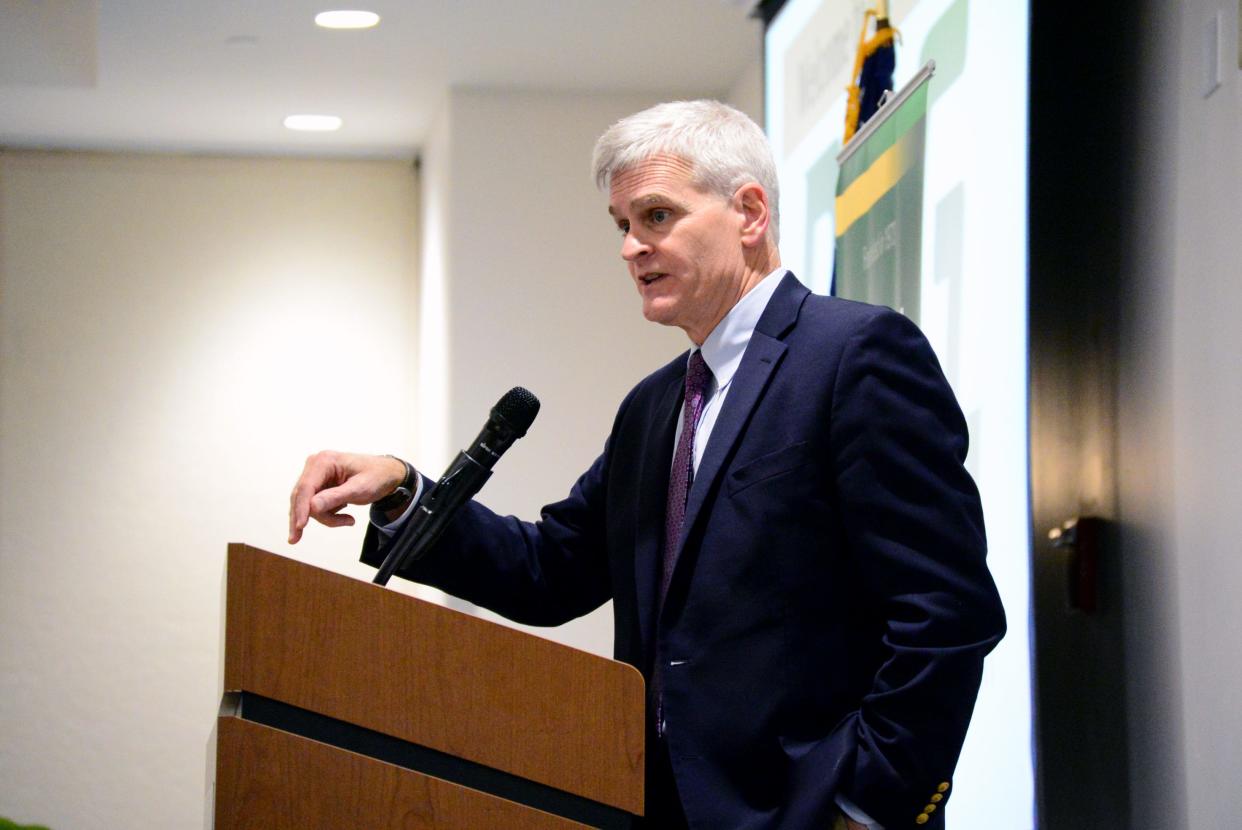Hurricane Helene delays vote in Senate on bill for coastal protection funding
A vote on a bill that would secure federal funding for states for coastal protection was delayed after a Senate committee adjourned early because of a Florida-bound hurricane.
The RISEE Act, a bipartisan bill sponsored by Sen. Sheldon Whitehouse, D-RI, and cosponsored by 26 others — including Democrats, Republicans, and an Independent — was scheduled to be voted on by the Senate Committee on Energy and Natural Resources Thursday, Sept. 26. The committee, however, adjourned early, in part because of Hurricane Helene.
“With the House now slated to leave town on Wednesday evening, in part due to an incoming hurricane in the Gulf Coast, any amendments to the bill in the Senate would complicate sending it to the president’s desk. And, as [Sen. Mike] Braun put it, many amendment votes ‘just burn time and never pass,’” Politico reported.

The Houma Courier reached out to Senator Chuck Schumer's, D-NY, office for confirmation, but did not receive a response in time for this story.
The current iteration of the bill establishes a framework for ensuring states receive a percentage of royalties collected from wind energy generated in their territory. It also removes the cap from oil field royalties and removes a federal 2% fee for mineral extraction.
Because the Senate adjourned early, the bill has been moved to be voted on in November. If the RISEE Act passes the committee, it then has an opportunity to be voted on by the entire Senate.
For a bill to become a law, it must pass both legislative bodies and then be signed into law by the President. A similar Bill has passed through the House of Representatives, March 30, 2023, known as the Lower Energy Costs Act, sponsored by House Majority Leader Steve Scalise, R-LA.
The RISEE Act has been floating around in one form or another since at least 2016, when an early version of it was introduced by Louisiana’s Republican Sen. Bill Cassidy. It was then known as the American Energy and Conservation Act. Cassidy has been pushing for each version of the bill in the Senate, and last year it passed through the committee but stalled out.
“By removing that revenue sharing cap, we bring back billions of additional dollars to Louisiana to help rebuild our shoreline, to help support flood control structures, and along the way create tens of thousands of good-paying jobs,” Cassidy said in a video call Sept. 24. “This is good for our economy, it’s good for our environment, it’s good for the nation.”
Oil Cap
Under current federal law, Louisiana and other oil producing states along the Gulf are capped on how much of the royalties they can receive. According to the Gulf of Mexico Energy Security Act of 2006, the total revenues available for these states, “shall not exceed $500,000,000 for each of fiscal years 2016 through 2055.”
This $500 million has portions of its funding dedicated to numerous sources and, according to the Louisiana Department of Energy and Natural Resources Director of Federal Affairs Neal McMillin, ends up being $375 million each year that is then divided among the states.
He said Louisiana receives the lion’s share of this money, but the cap meant Louisiana received about $156 million last year.
“If RISEE had been passed by 2023, the most recent year that Gomesa is paid out by the Department of the Interior, Louisiana would have gotten an estimated $88.7 million more than the $156 million it received. That would've been a 58% increase,” he said. “Louisiana would have gotten that because the cap went into effect and reduced the amount of otherwise eligible dollars to be shared with the state.”
This money is the primary source of recurring funding for the Coastal Restoration and Protection Authority.
Wind Energy

Prior to 2006, Louisiana and other Gulf states saw none of the royalties from oil. It wasn’t until an amendment to the Louisiana Constitution by then-State Sen. Reggie Dupree that dedicated a portion of the funds to coastal protection, restoration and rehabilitation that the federal government gave states a share.
The RISEE Act mimics Dupree’s legislation on the national level with regards to wind energy. It would dedicate 50% of royalties for the federal government, 37.5% for the states, and 12.5% for the National Oceans and Coastal Security Fund.
The 50% goes to the National Treasury. The 37.5% would potentially be further split to not just the state the turbine is located in, but any states within a 75-mile radius of it. The 12.5% would establish grants that include coastal restoration, rehabilitation, restoration, education, sustainable seafood production and resiliency.
This article originally appeared on The Courier: Hurricane Helene delays Senate vote on coastal protection funding bill






